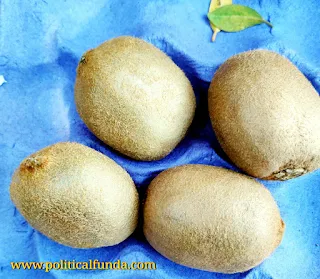Kiwifruit
In China, kiwifruit was traditionally used as
a medicine to aid in the growth of children and the recovery of women who had
recently given birth.
Uses of Kiwi:
Kiwis are rich in vitamin C and fibre, and
they have a number of health benefits. This tangy fruit is beneficial to your heart, digestive system, and immune system. The kiwifruit is a healthy fruit with a lot of vitamins and antioxidants. It's a delicious and nutritious snack, side dish, or rare dessert thanks to its tart flavor, good texture, and low calorie count.
Actinidain (also written actinidin) is found
in raw kiwifruit and is used as a meat tenderizer and probably a digestive aid
in the food industry. Since actinidain digests milk proteins, raw kiwifruit
should not be used in desserts with milk or other dairy products. This is true
for gelatin-based desserts because the actinidain dissolves the proteins in the
gelatin, allowing the dessert to liquefy or prevent it from solidifying.
Kiwifruit Cultivation
Nutrition of Kiwi:
Green kiwifruit contains 61 calories per 100
gramme (3.5 oz) serving, is 83 percent water, and 15 percent carbohydrates,
with no protein or fat . It contains high levels of vitamin C (112 percent DV)
and vitamin K (38 percent DV), as well as a modest amount of vitamin E (10
percent DV) and no other micronutrients. The nutritional value of gold
kiwifruit is close to that of regular kiwifruit, but it contains more vitamin C
(194 percent of the daily value). 62 percent alpha-linolenic acid, an omega-3
fatty acid, is contained in kiwifruit seed oil. Carotenoids contained in
kiwifruit pulp include Provitamin A beta-carotene, lutein, and Zeaxanthin.
Nutrition Facts of Kiwifruit:
|
Nutrition Kiwifruit, raw Nutritional value per 100 g |
|
|
Energy |
63 kcal |
|
Carbohydrate |
15.8 g |
|
Dietary fiber |
1.4 g |
|
Sugar |
12.3 g |
|
Fat |
0.28 g |
|
Protein |
1.02 g |
|
Vitamins Quantity %DV† |
|
|
Vitamin A |
24 μg |
|
Thiamine (B2) |
6% |
|
Niacin (B3 |
2% |
|
Pantothenic acid (B5) |
2% |
|
Vitamin B6 |
6% |
|
Folate (B9) |
8% |
|
Vitamin B12 |
3% |
|
Vitamin C |
194% |
|
Vitamin E |
9% |
|
Vitamin K |
6% |
|
Minerals Quantity %DV† |
|
|
Calcium |
2% |
|
Magnesium |
3% |
|
Manganese |
2% |
|
Phosphorus |
4% |
|
Potassium |
7% |
|
Zinc |
1% |
|
Other Constituents |
|
|
Water |
82 g |
Kiwi
Health Benefits of Kiwifruit:
Vitamins, fibre, and antioxidants can all be
beneficial to your health. The flesh is high in vitamins that boost immunity
and reduce disease risk.
Kiwis contain soluble dietary fibre, which
can aid in daily and balanced digestion. Some health benefits of kiwis include:
Boost Immunity:
Vitamin C is abundant in kiwifruit, which
boosts the body's immune response. The kiwifruit, in fact, contains around 230
percent of the daily recommended Vitamin C intake. Every bite of this vibrant
fruit is packed with immune-boosting nutrients. Rich in Vitamin C content the
Kiwifruit is a best suited friuts for Immunity.
The antioxidant content of kiwifruit is also
high. Antioxidants aid in the removal of free radicals and the reduction of
oxidative stress in the body. In the long run, this could protect the body from
disease and inflammation.
Healthy Heart:
The kiwifruit has blood pressure-lowering
properties. The kiwifruit will lower the risk of stroke and heart disease by
helping to maintain a healthy blood pressure and providing a boost of Vitamin
C.
Aside from that, kiwi fruit is rich in
dietary fibre. Fiber can lower LDL, or bad cholesterol, and thereby reduce
heart disease risk factors. A high cholesterol level can cause atherosclerosis,
or the hardening of the arteries in the heart.
Control Blood Pressure:
Kiwi fruits will help us control our blood
pressure as well as provide an extra boost to our immune system. According to a
2014 report, the bioactive compounds in three kiwis per day can reduce blood
pressure more effectively than one apple per day. Long-term, this may mean a
reduced risk of elevated blood pressure-related disorders such as strokes or
heart attacks.
Reduces blood clotting:
Kiwis will help us control our blood pressure
while also lowering the risk of blood clotting. According to a study conducted
by the University of Oslo, eating two to three kiwis per day significantly
reduced the risk of blood clotting. They were also discovered to minimize blood
fat levels. These results were close to those of a daily dose of aspirin to
improve heart health, according to the researchers.
Healthy Digestive System:
The kiwifruit has a lot of dietary fibre in
both its tough skin and flesh. Constipation, as well as a host of other
gastrointestinal problems and pain, can be helped by fibre.
Asthma Management:
Vitamin C levels in kiwis have been related
to a decrease in wheezing symptoms in some asthma patients. This is
particularly true for youngsters, who seem to profit the most from eating
kiwis.
Healthier Eye site:
The high levels of antioxidant vitamins and
carotenoids contained in kiwifruit can help to prevent eye disease and promote
overall ocular health when combined with other vitamin and mineral-rich fruits
and vegetables.
Allergy:
For some people, particularly children, the
actinidain found in kiwifruit may be an allergen. The most common symptoms are
itching and mouth soreness, with wheezing being the most common extreme
symptom; anaphylaxis may occur.
Click here for Immunity Booster | VitaminsNeeded for Good Immune system
Click here for Ginger | Ginger Medicinal uses, Health Benefits & Nutrition












0 Comments